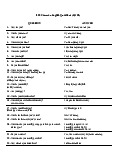





Preview text:
1. Why is it important for students to be in good physical health?
Good physical health is crucial for students for several reasons,
encompassing both academic performance and overall well-being. Here
are some key points highlighting its importance. The first reason is
good physical health enhances cognitive function, Physical health
significantly impacts brain function. Regular exercise increases blood
flow to the brain, promoting neural growth and improving cognitive
abilities such as memory, concentration, and problem-solving skills.
The second reason is to make students like going to school more. Many
school activities, including physical education classes, and sports,
require a certain level of physical fitness and students can play team
sports such as soccer and football. or badminton. Best of all, when
doing these activities, students feel less stressed about studying and
they feel that going to school is no longer so bad.
In summary, good physical health lays the foundation for students'
academic success, emotional well-being, and social development.
2. Why is it sometimes difficult for students to have a healthy lifestyle?
Students often struggle to maintain a healthy lifestyle due to various
factors. Academic pressure, such as heavy schoolwork and exams,
leads to stress and limited time for exercise and proper meals.
Balancing studies, jobs, and social life leaves little room for healthy
habits. Additionally, many students aren't fully aware of what
constitutes a healthy lifestyle. Fast food is more accessible and often
cheaper than healthy options, contributing to poor diet choices. Social
influences and peer pressure can lead to unhealthy eating and
sedentary activities. Mental health issues, like anxiety and depression,
can reduce motivation for maintaining healthy habits. Sleep
deprivation due to late-night studying or social activities further
impacts energy levels and health choices. Addressing these issues
requires education, supportive environments, and promoting wellness in schools and communities.
3. What advice would you give to someone who wants to live to
be 100 years old? What should the person do or not do?
To live to be 100 years old, it's essential to prioritize health and
wellness. Firstly, maintain a balanced diet rich in fruits, vegetables,
whole grains, and lean proteins while limiting processed foods, sugar,
and saturated fats. Regular exercise, including cardiovascular
activities, strength training, and flexibility exercises, is crucial for
maintaining physical fitness and mobility. Additionally, prioritize mental
health by managing stress, staying socially engaged, and practicing
mindfulness or meditation. Avoiding harmful habits such as smoking,
excessive alcohol consumption, and risky behaviors is vital for
longevity. Regular health check-ups and screenings can help detect
and prevent potential health issues early. Lastly, cultivate a positive
outlook on life, maintain strong social connections, and engage in
activities that bring joy and purpose. Overall, adopting a holistic
approach to health and well-being is key to living a long and fulfilling life.
4. Give a presentation to a group of students about an idea for
a good health product or program.
I would like to introduce an idea for a wellness program tailored to
students' needs. Our program, "HealthyU," aims to promote physical
activity, balanced nutrition, and mental well-being among students.
Through interactive workshops, fitness classes, and cooking
demonstrations, students will learn practical skills for maintaining a
healthy lifestyle. Additionally, "HealthyU" will provide access to
resources such as healthy meal plans, workout routines, and mental
health support services. Our program will also incorporate fun
challenges and incentives to motivate participation and foster a sense
of community. By empowering students with the knowledge and tools
to prioritize their health, "HealthyU" aims to create a culture of
wellness on campus. With the support of the student body and
university administration, we believe "HealthyU" can make a significant
impact on the overall health and well-being of students.
5. Having a healthy lifestyle is not the most important thing if
you want to live a long life.
While having a healthy lifestyle is undoubtedly important for longevity,
it's not the sole determining factor. Other aspects, such as genetics,
access to healthcare, socio-economic status, and environmental
factors, also play significant roles. However, maintaining a healthy
lifestyle can greatly reduce the risk of chronic diseases and improve
overall well-being, contributing to a longer and more fulfilling life.
Balanced nutrition, regular exercise, adequate sleep, stress
management, and avoiding harmful habits like smoking and excessive
alcohol consumption are crucial components of a healthy lifestyle.
Ultimately, while it's not the only factor, prioritizing a healthy lifestyle
can significantly enhance the quality and duration of one's life.
6. People should dress up for work every day.
While dressing up for work every day may be perceived as professional
and respectful, it's essential to consider individual preferences, job
requirements, and workplace culture. While some professions and
industries prioritize formal attire, others emphasize comfort and
functionality. Additionally, remote work and flexible schedules have
become more common, blurring traditional dress codes. Forcing
everyone to dress up daily may not align with modern work-life balance
trends or accommodate diverse needs. Ultimately, what matters most
is professionalism, productivity, and mutual respect in the workplace.
Encouraging employees to dress appropriately for their roles and
respecting their personal choices fosters a positive and inclusive work
environment. Flexibility and understanding of dress codes can promote
employee morale and well-being, leading to increased job satisfaction and performance.
7. High school students should wear uniforms to school.
The debate over whether high school students should wear uniforms to
school is ongoing. Proponents argue that uniforms promote a sense of
unity and equality among students, reduce distractions, and instill a
sense of discipline. Uniforms can also alleviate the pressure to keep up
with fashion trends, thus fostering a more inclusive environment.
Additionally, uniforms can help identify students, enhancing campus
security. However, opponents argue that uniforms limit students'
freedom of expression and individuality. They believe that allowing
students to dress as they please encourages self-expression and
creativity. Moreover, purchasing uniforms can be costly for some
families, adding financial strain. Ultimately, whether high school
students should wear uniforms depends on the values and priorities of
the school community. While uniforms may offer certain benefits, it's
essential to consider the potential drawbacks and ensure that any
uniform policy is implemented thoughtfully and fairly.
8. It’s important to have an individual style and not to dress like everyone else.
Having an individual style is crucial as it allows for self-expression and
uniqueness. Dressing differently from others allows individuals to
showcase their personality, interests, and creativity. It promotes
confidence and a sense of identity, empowering individuals to stand
out in a crowd and make a memorable impression. Moreover,
embracing individual style fosters diversity and acceptance,
encouraging others to express themselves authentically. It sparks
creativity and innovation in fashion, leading to a more vibrant and
dynamic society where people celebrate differences rather than
conform to norms. However, while it's essential to cultivate personal
style, it's equally important to respect others' choices and avoid
judgment based on appearance. Ultimately, embracing individuality in
a fashion not only enhances self-esteem and authenticity but also
contributes to a more inclusive and culturally rich environment.
9. You should always look your best, even when you’re just
going out for coffee or to the grocery store.
While presenting oneself well is important in various situations, such as
professional settings or special events, it's also essential to strike a
balance between appearance and comfort. While going out for coffee
or to the grocery store, prioritizing comfort and practicality may be
more appropriate than striving for a meticulously curated appearance.
It's crucial to respect individual preferences and recognize that
everyone has different standards and comfort levels when it comes to
personal presentation. Emphasizing inner confidence and authenticity
over external appearance fosters a healthier mindset and promotes
acceptance of oneself and others in all settings, whether casual or
formal. Ultimately, feeling comfortable and confident in one's own skin
is key to exuding genuine charm and making meaningful connections,
regardless of the setting or occasion. 10.
Do you think parents should pay their children for good grades? Why or why not?
Paying children for good grades is a topic of debate. Some argue that it
incentivizes academic achievement and teaches the value of hard
work. However, others believe it may undermine intrinsic motivation
and a genuine desire to learn. Instead of focusing on the joy of
learning, students may prioritize earning money, potentially leading to
short-term success without long-term educational benefits.
Furthermore, paying for grades could create inequality among students
whose families can afford such incentives and those who cannot.
Instead, parents can foster a supportive environment that emphasizes
the importance of education, sets clear expectations, and celebrates
academic progress regardless of grades. Encouraging intrinsic
motivation, curiosity, and a love for learning lays a foundation for
lifelong success beyond monetary rewards. Therefore, while financial
incentives may offer short-term gains, cultivating intrinsic motivation
and a passion for learning is crucial for sustained academic
achievement and personal growth. 11.
What do you think most motivates people to succeed in
school and at work? Money or something else.
While money can be a significant motivator for some people, especially
in the workplace where financial rewards are often tied to performance,
it's not the sole factor that drives success in school and work. Many
individuals are motivated by factors beyond financial gain, such as
personal fulfillment, intrinsic satisfaction, a sense of accomplishment,
recognition, and the desire to make a positive impact. In school,
students may be motivated by a genuine interest in learning, achieving
academic goals, pursuing their passions, or gaining knowledge and
skills for future endeavors. Similarly, in the workplace, employees may
be driven by opportunities for growth, professional development, job
satisfaction, meaningful contributions to projects or causes they
believe in, and a sense of belonging within their team or organization.
Ultimately, while money can be a powerful motivator, it's often
complemented by other factors that contribute to individuals' success
and fulfillment in both school and work. 12.
Should young people be allowed to have credit cards?
Whether young people should be allowed to have credit cards is a
contentious issue with valid arguments on both sides. Advocates argue
that credit cards can teach financial responsibility and help build credit
history if used wisely. It can also provide a safety net for emergencies
and convenient payment options. However, opponents raise concerns
about the potential for young people to accumulate debt, lack of
financial literacy, and susceptibility to impulsive spending. Without
proper education and guidance, young cardholders may fall into debt
traps with high interest rates and fees. Therefore, while some may
benefit from having credit cards, strict regulations, comprehensive
financial education programs, and parental guidance are crucial to
ensure responsible usage and prevent financial mismanagement
among young people. Ultimately, the decision should consider
individual maturity levels, financial literacy, and support systems in place. 13.
Give a presentation on a transportation problem and
suggest solutions to solve the problem.
One transportation problem that many urban areas face is traffic
congestion. This issue not only leads to wasted time and fuel but also
contributes to air pollution and increased stress levels among
commuters. To address this problem, several solutions can be
considered. Firstly, investing in public transportation infrastructure,
such as expanding bus routes, building new subway lines, or
implementing light rail systems, can encourage more people to use
public transit instead of driving. Additionally, promoting alternative
modes of transportation like biking and walking by creating more bike
lanes and pedestrian-friendly streets can help reduce the number of
cars on the road. Implementing congestion pricing schemes or
carpooling incentives can also encourage people to share rides and
reduce traffic congestion. Finally, adopting smart traffic management
systems and utilizing technology to optimize traffic flow can improve
overall transportation efficiency and alleviate congestion. 14.
Give a presentation on the advantages and
disadvantages of nuclear power.
Nuclear power offers several advantages, including its low greenhouse
gas emissions, high energy output, and reliability as a baseload power
source. It contributes significantly to reducing air pollution compared to
fossil fuel-based power plants. Additionally, nuclear power plants
operate continuously, providing a stable and consistent energy supply.
However, there are notable disadvantages to consider. Nuclear
accidents highlight the potentially catastrophic consequences of
reactor failures. The long-term storage and disposal of radioactive
waste pose environmental and safety concerns. Furthermore, the high
initial construction costs, potential for nuclear proliferation, and public
perception of safety risks are significant drawbacks. While nuclear
power offers a viable alternative to fossil fuels, careful consideration of
its advantages and disadvantages is essential in determining its role in the global energy mix. 15.
Do you think that special occasions have become too commercial?
Yes, special occasions have become increasingly commercialized in
modern society. Many holidays and celebrations, once rooted in
tradition and meaning, are now heavily influenced by consumerism.
Companies capitalize on these events to promote excessive spending
on gifts, decorations, and lavish experiences, often overshadowing the
original purpose of the occasion. Moreover, the pressure to conform to
societal expectations and portray a certain image can lead individuals
to spend beyond their means in pursuit of perceived status or
validation. While commercialization has its benefits for businesses and
the economy, it can detract from the genuine sentiment and
significance of special occasions. Striking a balance between
commercial interests and preserving the authenticity of traditions is
essential to ensure that these occasions maintain their cultural and emotional value.




